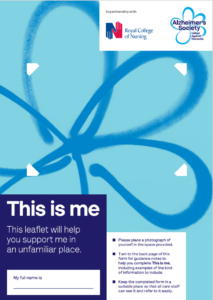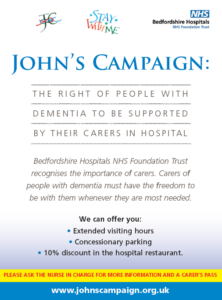While you and the person you care for are attending hospital we are determined to provide you both with the best possible care and support. Our aim is to enable the person with Dementia to return to their usual place of residence as soon as it is safe and sensible to do so.
Definition of a carer
A carer is someone who spends a significant proportion of their life providing unpaid support to a family member or potentially friends. This could be caring for a relative, partner, friend who is ill, frail, disabled or has a mental health or substance misuse problems. (National caring strategy 2010)
If you feel you need further information, or support as a carer, please contact your local authority.
Alternatively, for Beds borough and Central Beds residence you can call Carers in Beds on 0300 1111 919, email contact@carersinbeds.org.uk, or Tibbs Foundation on 01234 210993.
For Luton residence, you can call the Disability Resource centre on 01582 470900 Email: info@drcbeds.org.uk
Or Alzheimer’s Society on 01582 470910
We recognise that coming into hospital can be an anxious time for everyone and especially for someone living with Dementia.
Unfamiliar surroundings and faces can often lead to increased anxiety and confusion. At Bedfordshire Hospitals NHS Foundation Trust we have introduced some simple measures to try and help.
What we are doing to try and support
We offer to place a discreet symbol above the patients bed to alert staff and prompt them to consider any additional needs the person with Dementia may have. This is an optional measure. If you would rather it was not present please contact the Dementia Nurse or ward manager to discuss.
This symbol will highlight to staff which Patients have additional needs due to their cognitive impairment, so that staff may adapt their approach and the way they communicate, for example:
- Asking one question at a time & giving the person time to answer
- Offering and recognizing the need for help with everyday tasks
- Understanding the symptoms of the disease.
This is me

‘This is me’ is a four-page booklet that we ask you to complete for us. The information provides a short biography of the person with Dementia.
It enables staff to use personable information in relation to communication, distractions, likes, dislikes and interests. This information can assist staff in understanding how they can help in a more familiar and meaningful way should the person become anxious or distressed.
Alternatively, you can go to our website and print one off to bring in with you.
The ‘This is me’ booklet should stay with the person and is filed in their notes on discharge. Should the person with Dementia have to return to hospital we would ask that you bring one back with you.
Dementia champions are members of staff who have received additional training in dementia care. Most departments now have champions in their teams. All new and existing staff will have been offered Dementia awareness training in accordance with National standard frameworks.
Johns Campaign is our pledge that offers carers the support and access to their loved ones while they are in hospital. We are able to offer you extended visiting rights (at the discretion of the nurse in charge). We are also pleased to offer you concessionary parking and 10% discount at our restaurants. You can ask for a carers pack from the ward staff and the relevant carers pass and parking forms are included; please remember to get them signed by the nurse in charge.

Our commitment to you as a carer
- We will aim to work in partnership with you and provide the support you require while you are visiting.
- We will acknowledge and value the role you have as carers, treating you with respect and dignity.
- It will be our aim to include you as a valued partner in care when we are planning and delivering the care and treatment for the person you are caring for. If you feel this is not the case please let the ward manager know or visit PALS for assistance.
- If you have a lasting power of attorney for health and welfare, please inform the staff and arrange to bring in a copy of proof for our records.
- We can offer you information regarding the support that is available to you as a carer. Carer assessments, local support.
- We can talk through your concerns and worries with you – you are welcome to book time to speak to the ward manager/Dementia specialist nurse/ Doctor/ chaplain etc.
Dementia support and advice is available:
Bedford Hospital
07393267838 / 01234355122 / ext 3307
Luton & Dunstable Hospital
07816366320 / 01582 497417
Monday to Friday 8:30am – 4:30pm
Asking for your feedback
We would really welcome your feedback regarding your experience with us, whether positive or if you feel there are improvements needed or if you simply have ideas you feel would help others. Please email yvonne.weldon@ldh.nhs.uk
PALS contact details:
Bedford Hospital – 01234 795814
pals@bedfordhospital.nhs.uk
Luton & Dunstable Hospital – 01582 497990
pals@ldh.nhs.uk
Your rights as a carer
- Request a carer’s assessment from social services. The care act 2015 entitles you to this assessment. This may enable you the opportunity to discuss the help and support you may need to continue in your caring role.
- Access Information about the range of services and support available to you to help you care and to give you a break.
- Benefits advice. You may be entitled to certain benefits.
For further information regarding carer’s assessment contact
- Luton – https://socialcare.luton.gov.uk/web/portal/pages/home
- Central Bedfordshire – https://www.centralbedfordshire.gov.uk/info/19/adults_and_older_people/303/dementia_-_support_looking_after_someone_and_housing/4
- Hertfordshire – www.hertsdirect.org/services
- Carers in Bedfordshire – contact@carersinbeds.org.uk
Alternative support services contact numbers:
Alzheimer’s society Luton 01582 470910
Tibbs Foundation 01234 210993
Carer’s support
- What does the person prefer to eat? Personal likes/dislikes? Bring in suitable finger foods; crackers, fruit, cakes, savory snacks, yoghurts, custards, puddings from home.
- Bring in any photos, photo albums, a family tree, reading material that may interest, pictures, books.
- Reminiscence is a valuable distraction sometimes.
- Consider any games you may be able to sit and play; dominoes, cards, puzzles etc.
- Music is a great distraction, it offers scope for meaningful conversation, reminiscence and cognitive stimulation. Try https://m4dradio.com.
- Make the bedside locker more personable to the person with recognizable items.
- Bring in their own dressing gown, slippers, and clothes (Please label where possible).
- Some people like touch, and use their hands a lot, consider hand activity items; hand massage or nail varnish for ladies, a rummage bag or box.
- Some ladies like their handbags with them. Remove valuables where possible.
- Scrap books with pictures of favorite items, places is a simple project.
- Hobby Magazines; cars, food, gardening, motorbikes.
Useful Contacts
- Alzheimer’s Society
www.alzheimers.org.uk
01234 327380 or 01582 404077 - Age UK
www.ageuk.org.uk
01582 456812 - The Disability Resource Centre
www.drcbeds.org.uk
01582 470900 - Carers in Hertfordshire
www.carersinherts.org.uk
01992 586969 - Dementia UK
https://www.dementiauk.org/
Open from 9.15am – 4.45pm Monday to Friday on
0845 257 9406 - Carers UK
www.carersuk.org.uk
0808 808 7777 - Carers in Bedfordshire
contact@carersinbeds.org.uk
0300 111 1919 - Disability Resource Centre
info@drcbeds.org.uk - Tibbs Foundation
contact@tibbsdementia.co.uk
01234 210993
